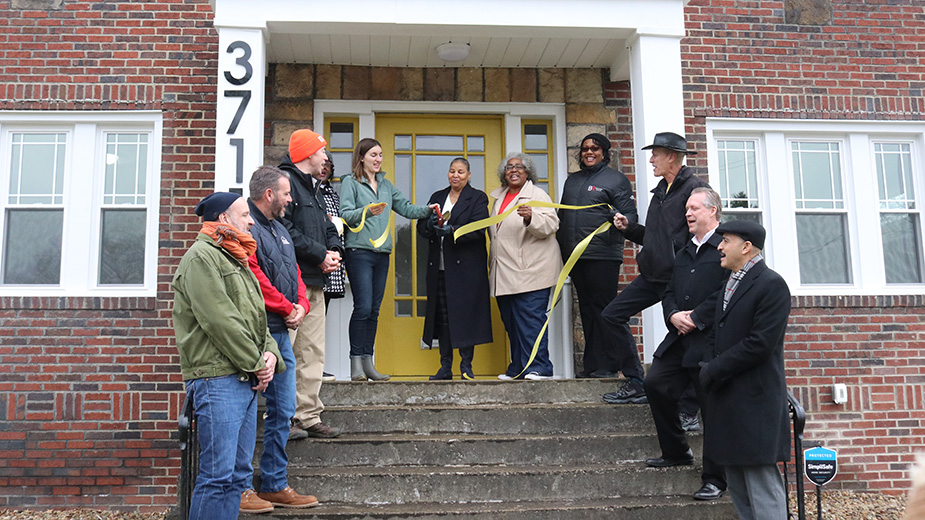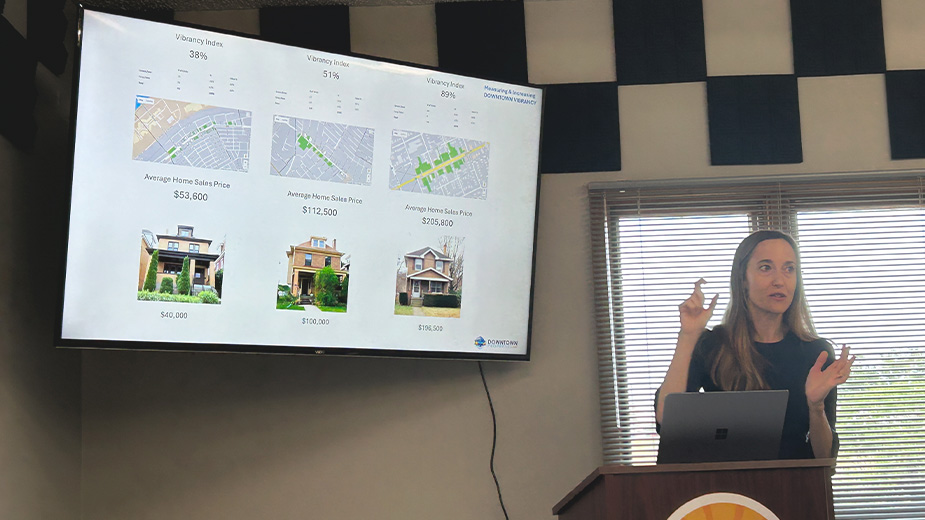Agencies Aid Those Living in Old Housing in a Food Desert
YOUNGSTOWN, Ohio – With inflation placing bigger burdens on those served by community nonprofits, leaders are finding ways to handle food and housing needs.
More senior citizens than ever are heading to a food pantry to supplement what they can no longer afford to purchase, according to Mike Iberis, executive director of Second Harvest Food Bank of the Mahoning Valley. Food pantry stock levels are down but hopefully are recovering, he added.
“Senior citizens are finding it much harder to manage a food budget based on inflation,” Iberis said, noting some of them have been retired for more than a decade and their dollars just are not stretching as far as they once did.
In addition to price increases, a reduction in SNAP benefits is creating more hurdles for those living in the Mahoning Valley, according to Rose Carter, executive director of Alliance for Congregational Transformation Influencing Our Neighborhoods (Action).
“That’s the challenge we have because we’re in a food desert,” Carter said, “and it looks like we’re getting deeper with the cuts that the government has made to our most vulnerable people, which are people of color, low- to moderate-income and, of course, our elderly.”
Organizations like Action, Second Harvest, the Mahoning-Youngstown Community Action Partnership and others are trying to do as much as they can to fill the increasing needs. Additionally, Carter said it is important to make sure people are not just eating, but also have the means to eat healthier.
Action operates a Mobile Market Truck, which gives people a place to shop for healthy fare. Jeff Magada with Flying High and Grow Urban Farm makes certain many of the foods available on the truck, such as meat and eggs, are locally sourced. Additionally, Carter said they strive to keep the food prices lower than stores where people in many neighborhoods have to travel to reach.
To make the food even more affordable, Carter said Mahoning County and Mercy Health gave them vouchers that can provide those who qualify with $25 per program per month. But the Mobile Market is not just for those needing financial assistance.
“Anybody can shop on our truck wherever the truck is,” Carter said. “So it is not just for the most vulnerable. It is for anyone, because we’re all in a food desert. … It’s a grocery store on wheels.”
With the assistance of commissioners and the city of Warren, Carter said a second, even larger truck soon will be operating in Trumbull County.
Another organization helping residents in that area is the Trumbull Neighborhood Partnership, which operates the Warren Farmers Market seasonally to provide fresh produce in the region.
Additionally, the partnership works with small corner stores that help to provide neighborhoods with healthy foods.
Likewise, Ian Beniston, executive director of the Youngstown Neighborhood Development Corp., which concentrates some of its efforts on the Glenwood Avenue corridor, said part of that effort is the Glenwood Fresh Market. With about 2,000 member clients participating, there were 13,823 unique visits to the Fresh Market in 2022.
Beniston said YNDC has found the biggest barrier to people eating healthy is financial, and the Fresh Market serves and provides lots of fresh produce, which member clients can access.
The revitalization of Glenwood Avenue is also addressing other quality-of-life needs in the neighborhood.
Beniston said YNDC was able to attract about 10 new businesses to the Glenwood Avenue corridor in 2022 by renovating buildings and identifying businesses looking to locate there. Those efforts included helping to bring urgent and primary care, the Fresh Market, a coffee shop and a restaurant. It is a challenge he sees as a priority continuing into 2023.
Housing Demands
On Wednesday YNDC and community leaders snipped a yellow ribbon (see photo at top) in front of a yellow door on another renovation project, a four-unit brick apartment building. The organization has been obtaining vacant buildings, investing to restore their deteriorating physical condition and maintaining their character while creating modern, rentable space on Glenwood Avenue.
“This is another step in, I think, a longer-term incremental revitalization of the corridor, really focused on bringing back basic, quality of life retail services and quality housing,” Beniston said of the $300,000 project.
The renovation project at 3711 Glenwood Ave. is part of YNDC efforts to save older homes and apartment buildings, with the end result of keeping neighborhoods vibrant.
In 2022, YNDC renovated 20 housing units in formerly vacant buildings. Beniston said there is a strong demand for newly renovated units, both for purchase and for rent. He sees a need for quality, affordable housing both in the city of Youngstown and throughout the region, which can be remedied by preserving existing housing, new construction and renovation.
“A lot of our rental housing stock throughout the region has aged. So we definitely know that we need more modern, safe, quality, affordable housing for all income stratas across the board throughout the region,” Beniston said. “Our focus has been more so on the city and affordable housing. But our experience has shown us it is not just a city issue – it’s a regional issue.”
Organizations like YNDC and the Trumbull Neighborhood Partnership also provide assistance for owner-occupied homeowners who struggle with the upkeep when an unexpected repair is needed.
Beniston said it’s vital to work with low- to moderate-income homeowners needing who need to make critical repairs to their homes. YNDC assisted with repairs for 247 owner-occupied residents last year, he noted..
The demographics of many of the communities served by the YNDC show more than half are low-income households, Beniston said, and it’s difficult once an income threshold is reached to be able to make a large repair without help.
“But if you look at the flipside, and if you let the house deteriorate, eventually, it’s going to be abandoned and then there is going to be a public cost to tearing it down,” Beniston says.
Matt Martin, executive director of the Trumbull Neighborhood Partnership, said during the pandemic his organization had more access to funding through the American Rescue Plan, which helped TNP to do more than before. The agency now has a full-time operation that helps those in owner-occupied houses complete unforeseen home repairs.
“We have a good amount of resources going forward to help folks,” Martin said, adding there is a fairly lengthy waiting list and process, but the resources are there.
Although TNP can’t help pay property taxes or make a house payment, when the furnace breaks, the roof leaks or a home needs help with handicapped accessibility, a qualifying homeowner can be placed on a waiting list.
Making certain that homes remain occupied and not abandoned is part of keeping strong neighborhoods.
“We want to save what can be saved and get rid of what can’t,” Martin said.
The land bank program operated through TNP has sold 600 abandoned properties and completed 1,500 demolitions in the past 10 years, he said.
TNP also was involved in commercial renovations and brownfield remediation, including the St. Joseph Riverside Hospital project in 2022. Martin said so much of what the organization is doing is about “building a better Warren.”
Pictured at top: The four-unit brick apartment building at 3711 Glenwood Ave., Youngstown, that was recently renovated by the Youngstown Neighborhood Development Corp..
Copyright 2024 The Business Journal, Youngstown, Ohio.



